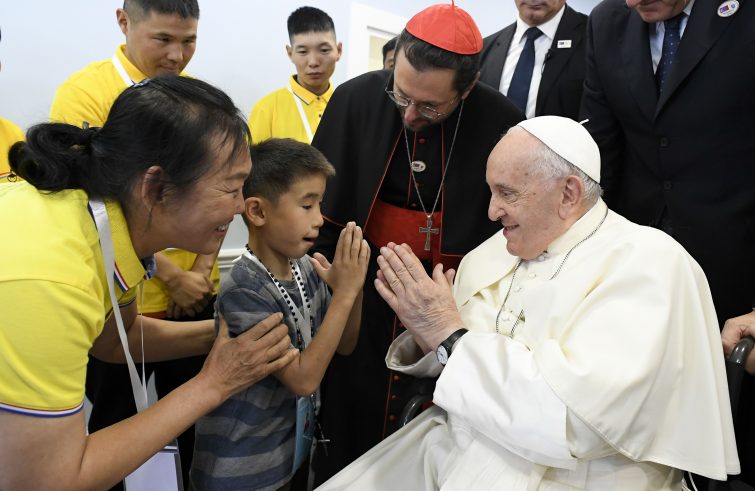
Although several days have passed since the end of Pope Francis’ 43rd International Apostolic Journey to Mongolia, Cardinal Giorgio Marengo, Apostolic Prefect of Ulaanbaatar, is still busy with the aftermath of the visit, which will remain in the memories and hearts of the people, full of gratitude towards the Pope. During the general audience on 6 September, Francis said that the visit to Asia had been good for him. In the same way, for the small Mongolian Catholic community, indeed for the entire population, the visit was a gift. SIR discussed the visit with Cardinal Giorgio Marengo.
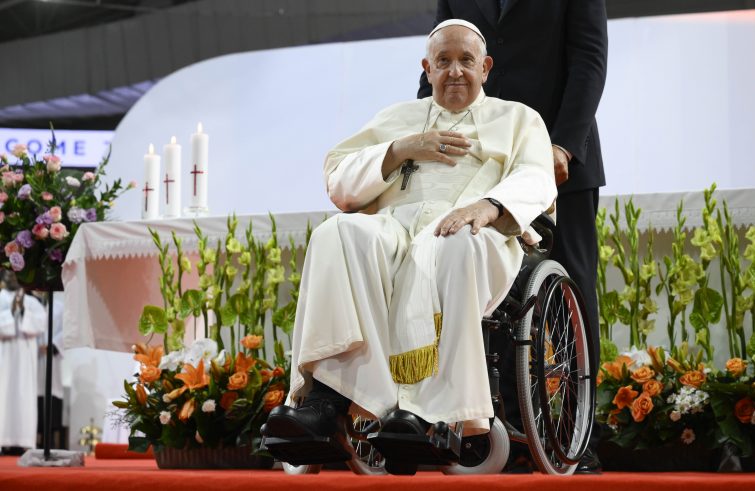 The Pope has said on several occasions that the Mongolian people are very dear to him. Was this affection felt during these days and how did the people reciprocate?
The Pope has said on several occasions that the Mongolian people are very dear to him. Was this affection felt during these days and how did the people reciprocate?
During the visit, a beautiful relationship was established between the Holy Father and the local population, not only the small Catholic community, but also the rest of the population. There was a real feeling of affection between the Holy Father and the Mongolian people. At first it was curiosity, but as the days went by it became affection, perhaps wanting to take a photo when he passed by, wanting to greet him. They greatly appreciated the Pope’s generous gesture of opening the car window to greet the greatest number of people he could.
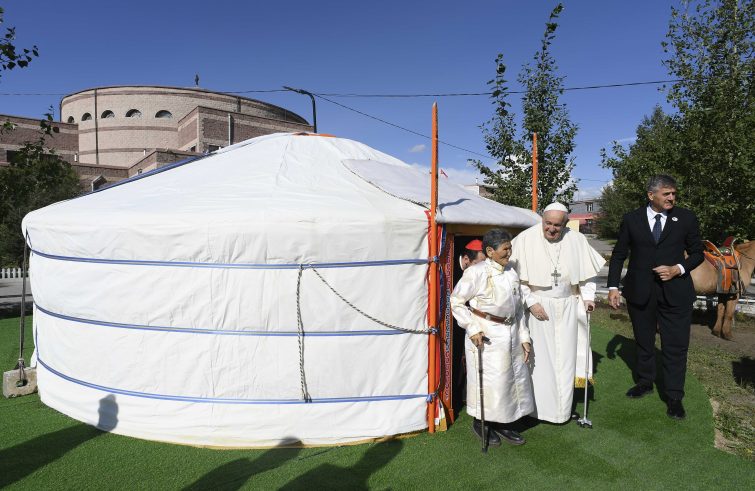 At the press conference on the return flight to Rome, the Pope expressed his satisfaction with the visit. What is your assessment? What do you think were the highlights of this visit?
At the press conference on the return flight to Rome, the Pope expressed his satisfaction with the visit. What is your assessment? What do you think were the highlights of this visit?
This journey was certainly a grace. It was a gift in every way.
We all think it was a very positive experience, there are no words to express how happy, satisfied and grateful we are to the Holy Father for having made this journey, for having chosen to travel to a distant part of the world, away from the limelight, as he said, to bring his witness and to listen, to dialogue. All the events planned had their own special value, so rather than talking about the most important moments, I would say that each of the events on the programme had a very special significance.
The solemn welcome in the square and then inside the Government Palace, with the very cordial meeting with the President of Mongolia, Ukhnaagiin Khürelsükh, was certainly a special event. It ended with a gesture of great closeness when the President, in greeting the Holy Father as he was leaving, leaned over because the Pope was in a wheelchair. Then, as Francis was returning to the car, he embraced him, a sign of reaching out beyond protocol that speaks volumes.
Then, of course, there was the meeting in the cathedral. The Holy Father entering an outdoor Ger. For the small Mongolian community, it will always remain sealed in their hearts, in their memories, a Pope who entered our home, who took an interest in us.
And then the family atmosphere that marked this meeting, with the beautiful testimonies, the sharing and the message that he offered, which has become a blueprint for our lives.
There were three other important moments, each in its own way: the meeting with the religious leaders, a truly prophetic sign of the commitment to walk together, to overcome tensions through mutual understanding, a common commitment to harmony and peace. Then the Mass in the Steppe Arena: seeing the words “Holy Father, welcome to Mongolia” on the screens seemed like a dream, but it was reality. The Eucharistic celebration was also one of the first to be attended by thousands of Mongolian citizens, so it was a very meaningful introduction to our life of faith, and of course it was the first time that the Holy Father presided at a Mass in Mongolia. The meeting in the House of Mercy on the last day was also marked by this closeness, a proximity to the suffering people, with a very clear message for us missionaries, for the community of faith in Mongolia:
a message of true, selfless charity, of caring for our neighbour that becomes the fragrance of Christ.
All these moments were precious.
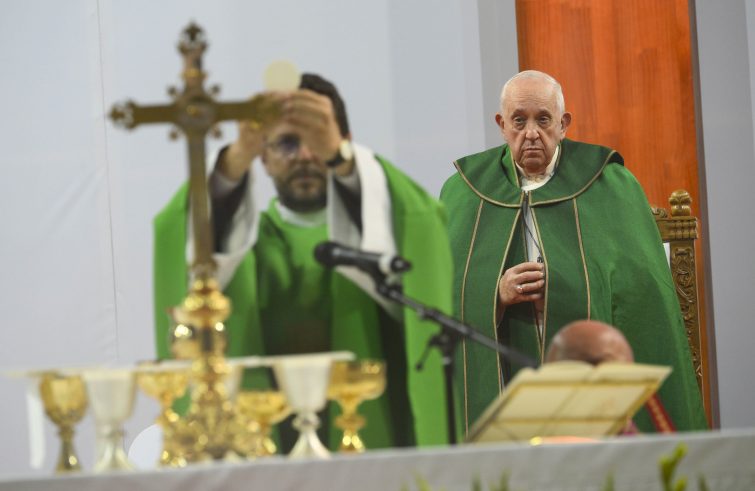 On a number of occasions during the journey the Pope made appeals for peace, to be ‘seeds of peace’ in a world torn by conflict. And once again, when asked by journalists whether Ulaanbaatar could serve as a platform for international dialogue between Europe and Asia, the Pope replied in the affirmative. How do you think this can be achieved?
On a number of occasions during the journey the Pope made appeals for peace, to be ‘seeds of peace’ in a world torn by conflict. And once again, when asked by journalists whether Ulaanbaatar could serve as a platform for international dialogue between Europe and Asia, the Pope replied in the affirmative. How do you think this can be achieved?
The Pope has made many appeals for peace. I think they were received with a great sense of gratitude and responsibility.
And it has become increasingly clear that Mongolia could play a role on the international chessboard; a country where the interested parties can sit together in a Ger, in a circular space, to reach an agreement, to achieve that balance between the forces that Mongolians have historically pursued and for the most part have been able to establish. I do not know how this can be achieved in practice, but it could be possible for Mongolia, Ulaanbataar, to become a meeting place, a place for summits between people who are committed to the search for peace.
It is a welcoming nation, organisationally capable, determined in the search for peace and conflict resolution. It could be a particularly suitable place for peace talks between negotiating parties seeking an agreement.
This realistic possibility of Ulaanbataar as a venue for peace summits is, I believe, not a fantasy, but in fact is quite feasible.
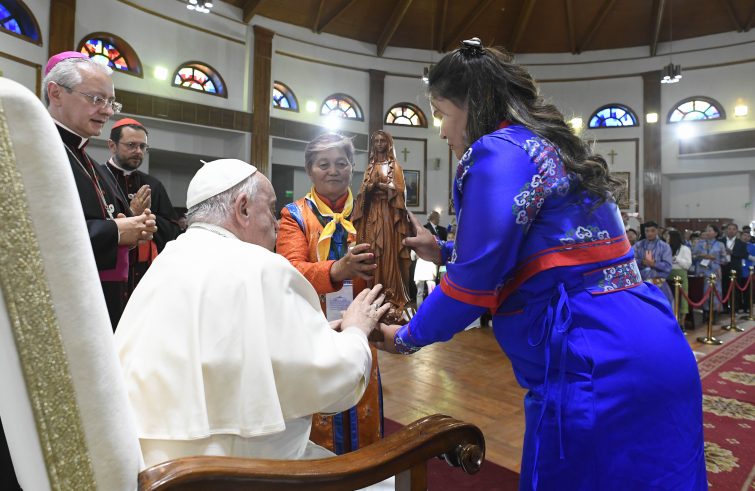 Francis has greatly encouraged the small but vibrant Mongolian Catholic community. What are your distinguishing traits?
Francis has greatly encouraged the small but vibrant Mongolian Catholic community. What are your distinguishing traits?
Perhaps one of the most distinguishing features of our small community in Mongolia, a tiny part of the Church, could be described as the freshness of the faith.
This community is made up of just under 1,500 people who, in the last thirty years, have embraced the faith, who have chosen to live as Catholics in the world, in a society where this is by no means a given, and who have done so in their own way, attracted, as the Holy Father has often reminded us, by the beauty of the faith, by the beauty of the Gospel experienced and made concrete by the missionaries and by other believers. Perhaps, then, its characteristic feature is that of a Church that walks with simplicity, with humility, in a context of freshness, of authenticity, with all the ups and downs that a life of faith brings, but also with the joy of discovering every day the beauty of the Gospel – and of making the effort and the commitment to transform it into concrete gestures, through the many activities that the missionaries have carried out for so many years for the benefit of the population in every sector of society: education, health care, care for the various forms of need, poverty, cultural promotion. Hence
a dynamic Church whose joy in the faith does not seek large numbers or external recognition, but seeks to follow the ways of the Gospel with simplicity.”
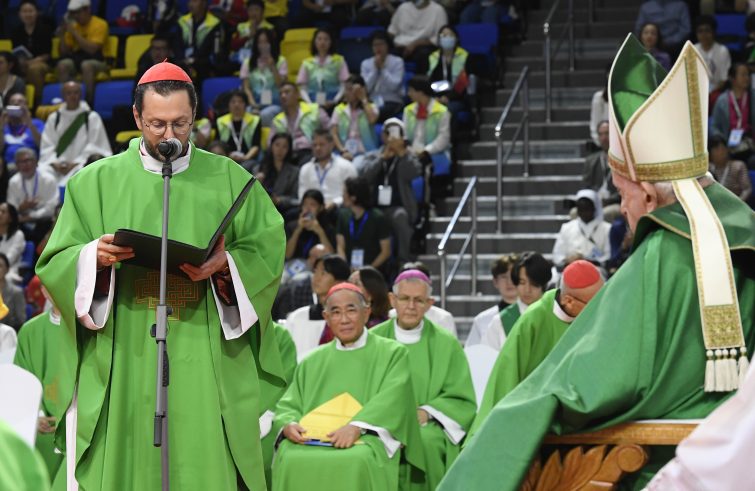 What can this small Church teach the rest of the world?
What can this small Church teach the rest of the world?
I believe that as a Church we have nothing to teach about anything, we have everything to learn. It is simply beautiful to live the faith in this way. I believe that if it is embraced, if it is shared, this beauty can be somewhat contagious. Let us welcome this gift and offer it with great simplicity.
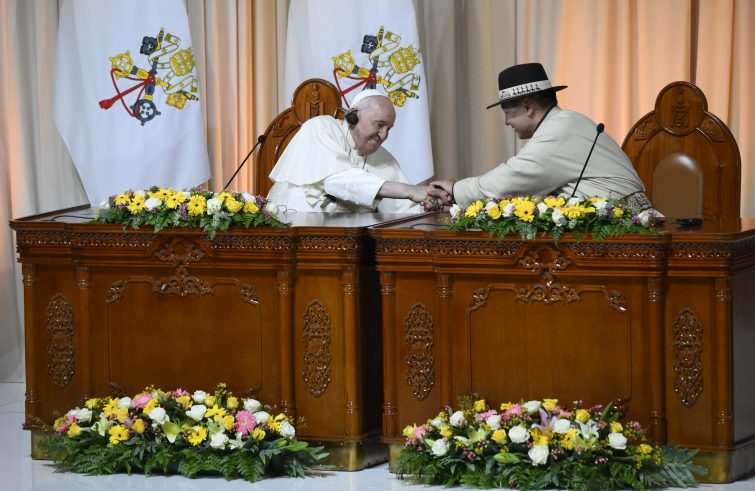 The Pope has also assured national dignitaries that the Catholic Church does not have a political agenda. What is your relationship with state institutions, non-Christian religions and society?
The Pope has also assured national dignitaries that the Catholic Church does not have a political agenda. What is your relationship with state institutions, non-Christian religions and society?
What the Pope said about the Church not having a political agenda, but being a leaven of good in society, is of paramount importance because it reaffirms the true identity of the Church and, in this sense, helps to dispel any false interpretations or fears in a country that has been marked by an atheist ideology for seventy years. It is important to reaffirm that the Church has her own identity, that she is not dependent on political, economic or power interests, but that she has a unique mission, which is the proclamation and practical application of the Gospel.
This is important because, in any case, there remains a certain suspicion of religion as a potential source of tension in society, especially where different religions coexist. This is why the Pope’s comment is very helpful, and it also helps us in our daily interaction with the civil authorities, with whom we have an excellent dialogue. But it is also important for us to have a point of reference, to explain who we are, because it is also true that in Mongolia there are different religious groups, of different nature and origin, and not all of them are linked to clear traditions, and therefore the State is sometimes confronted with some opaque religious experiences. On the contrary, this clarity that the Pope has expressed about the Catholic Church is extremely important.
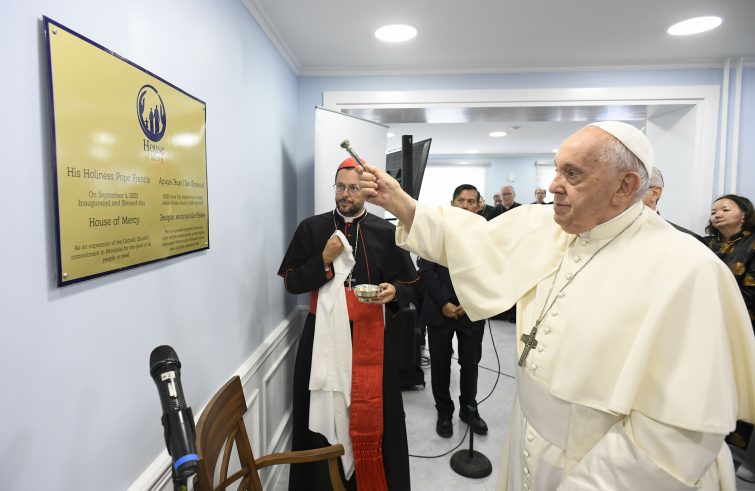 The House of Mercy has been officially inaugurated and blessed by the Pope: what is its mission?
The House of Mercy has been officially inaugurated and blessed by the Pope: what is its mission?
The House of Mercy will be a door open to all those who are in need, especially the homeless, who are not very numerous, but who face a very harsh ordeal, especially in winter, when to live outdoors is to condemn oneself to death. Therefore, it will be a shelter from the harsh winter cold, a place where a warm meal is served, where it is possible to take a shower, to talk to someone, where anyone can express their distress. For our part, we are committed to listening to and responding to the different forms of need, in great synergy with the social realities that already exist. In fact, Mongolia has a national health insurance system and hospitals provide the necessary medical care, so it is not our intention to overlap. We simply want to offer the Christian way of reaching out to people and bringing them into contact with what is good in society. Specifically, there will be a soup kitchen for the needy, public showers, areas for counselling and first aid, a small clinic for first aid, rooms for people who may need to stay for a few days, those who have fled domestic violence or similar situations, as well as areas for volunteers, for the people who will work in the House, for the various professionals who will be there, bearing in mind that it could become a focal point for the local Church during meetings that attract participants from all over the country.
The other characteristic is that this experience is being proposed as an expression of the local Church and is therefore directly linked to the Apostolic Prefecture and, of course, with the contribution, the collaboration of the various religious Congregations in the country. Above all, however, it is being proposed as an initiative of the local Mongolian communities, who join hands, help each other and dedicate themselves to their brothers and sisters.
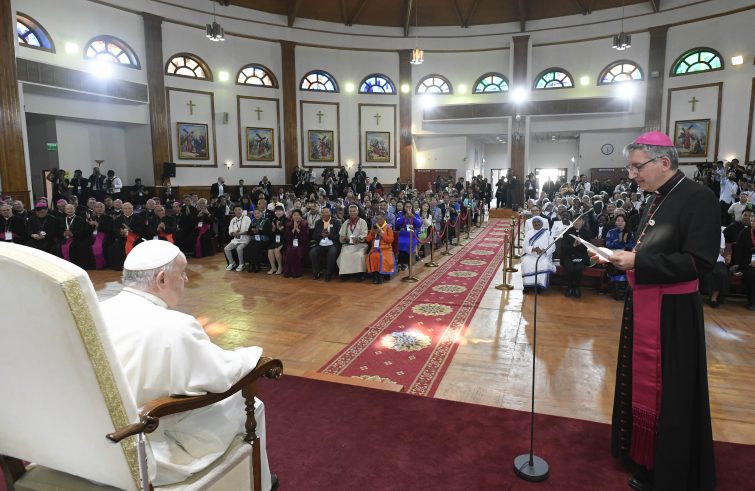 What fruits do you hope the Pope’s visit will bear in your Church?
What fruits do you hope the Pope’s visit will bear in your Church?
We are certainly going to cherish with gratitude and intensity the seeds that the Holy Father has sown with full hands in this visit, and therefore we are confident that we will see the fruits of this visit, precisely because of its overwhelming value.
It will certainly be up to us to ensure that the Holy Father’s resounding appeals do not fall on deaf ears, so that his speeches become a pastoral programme for us all. We are already planning to publish the various speeches in the form of a booklet in Mongolian, which will also be made available to people outside the Church and which will become a kind of agenda for us to follow in the coming years.
In this respect, the fruits can be summed up as a renewed awareness of who we are as a Church in this society; an increased visibility given to us by the Pope as a community of believers with its own identity. Indeed, it is sometimes difficult here to distinguish between the various denominations within the Christian world. The Pope’s visit will now make it easier for us to refer to him, to what he represents in the world, and so it will also be possible for him to make a fundamental contribution to the continuation of the relations we have with the civil authorities, in order to resolve some situations that still need to be resolved at the legal level, at the level of guaranteeing the presence of missionaries and the registration of our activities.
A concrete fruit could be the contribution to the continuation of the negotiations for a bilateral agreement between the Holy See and Mongolia.
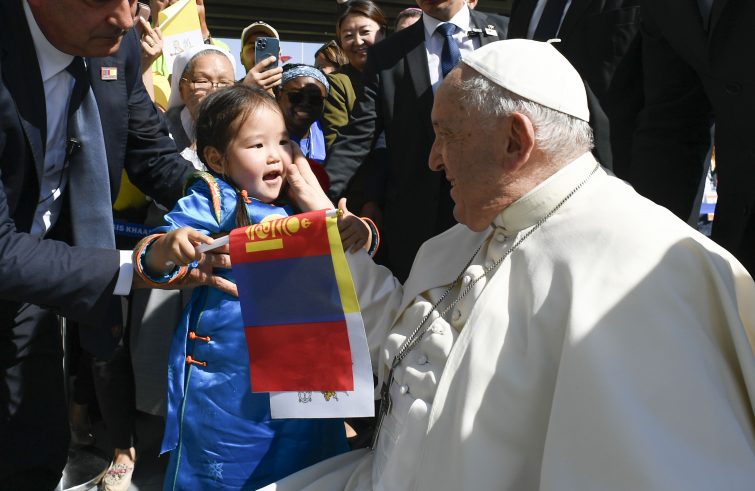 How will the journey continue, also in the light of the ongoing Synodal Way?
How will the journey continue, also in the light of the ongoing Synodal Way?
As the catechist Rufina said in her testimony, our experience as Church in our small way is itself a synodal experience, and we want it to continue in this direction, which, as the Holy Father had the opportunity to clarify on the return flight to Rome, is the perspective of the Acts of the Apostles, of the Gospels. It is not new, it is not odd. It is the identity of the Church. For us, it means continuing along this path, knowing the points worth highlighting: in particular, the Holy Father emphasised the need for a profound life of prayer that anchors all our charitable efforts, and the importance of ecclesial communion in walking together towards Christ.
So the journey continues, and let us hope that it will also bear new fruits of interest in the Catholic Church, or at least of affection, of positivity, which is a great thing in itself: to be seen not just as members of another religion, representing a very small minority, but as a community of this small dimension, which nevertheless works for the good of the country and is reliable, a credible partner.











